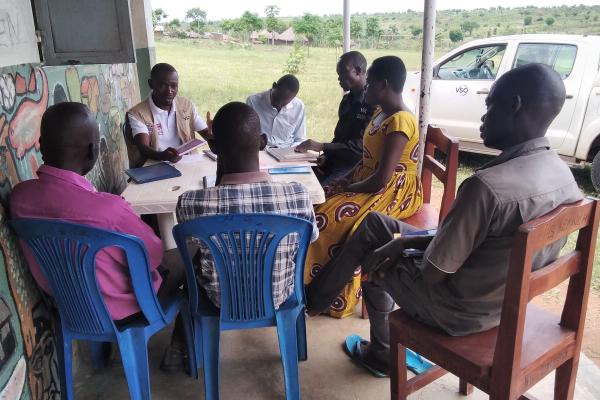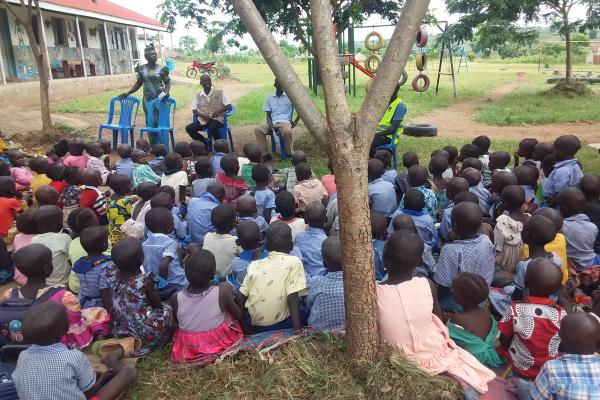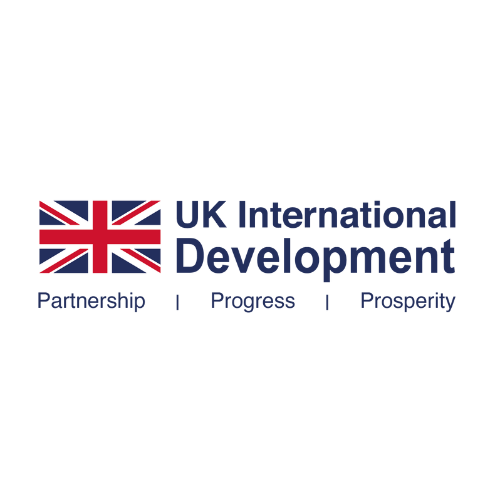Jockim Mukeh is a VSO Disability and Inclusion Advisor working in the Bidibidi settlement in Yumbe District, West Nile region, Uganda, as part of the ACTIVE (Active Citizenship Through Inclusive Volunteering and Empowerment) project.
With a background in teaching, Jockim holds a bachelor's degree in special needs education and a postgraduate diploma in project planning, monitoring, and management. His journey into this field is rooted in a personal story, which continues to inspire his work today.
What inspired you to pursue a career in special educational needs?

Since my childhood, growing up in Uganda, I’ve always aspired of becoming a teacher. Being in the classroom felt natural to me. I was drawn to the idea of standing in front of others, teaching and inspiring them.
As I grew older, my family discovered that one of my brothers had a disability, which many of my relatives struggled to understand. I took it upon myself to care for him and closely followed his development, determined to support him in every way I could. The Rwenzori Association of Parents of Children with Disabilities (RAPCD), a Kasese-based organisation, provided him with the needed support.
Inspired by my brother’s experience, I pursued studies to deepen my understanding of people with disabilities. After graduation, I began working at a rehabilitation centre, where I supported individuals with disabilities and collaborated with rehabilitation specialists from various fields. I was also tasked with helping children in schools, teaching them practical skills like vegetable gardening, and enhancing their social and generic play skills through play activities. This experience ignited my passion for working with people with disabilities.
Did you volunteer prior to joining VSO? If so, where?
Before joining VSO, I gained volunteering experience working with a range of organisations. I started with the Ministry of Education and Sports as an education assistant grade three teacher and later worked as a tutor at a teacher training college, where I trained teachers in early childhood care and education. I also worked at the Kyaninga Child Development Centre in Fort Portal, Uganda, where I supported children and the teaching staff.
I also volunteered with St. John Ambulance's Kasese branch, providing first aid to communities during public events and health emergencies, such as cholera outbreaks. I then moved to humanitarian international organisations, where I served as an inclusive education officer, team leader, and inclusive education supervisor, furthering my commitment to inclusive education and community support.
Why did you choose to join VSO?

While volunteering with St. John Ambulance, I researched various organisations and discovered VSO.
What intrigued me most was VSO’s approach of working with blended teams of national, community, and international volunteers.
I was drawn to how VSO focuses on training and empowering local volunteers to lead project activities, ensuring that the knowledge and skills gained continue to benefit the community long after the project ends.
By recruiting volunteers directly from the communities they serve, VSO fosters collaboration that creates lasting change and a true sense of ownership. These values resonated with me, which is why I chose to join VSO. In December 2022, I proudly became part of the team as a Disability and Inclusion Advisor.
What is your role in the project?
The project aims to improve access to quality, equitable education for all. One of my main responsibilities has been helping to create inclusive and safe learning environments. Additionally, I work to build the capacity of the community and stakeholders to be more resilient and take an active role in early childhood care and education (ECCE) programmes.
Finally, I focus on strengthening the governance and management of ECCE by empowering communities to take ownership of these centres, ensuring their long-term sustainability and success.
Parents play a crucial role in the successful implementation of the ECCE project. They provide essentials for their children's education, such as food, school supplies, and security. They are also expected to support the caregivers who teach their children.

The blended volunteer team offers a multi-faceted approach, and volunteers like me go the extra mile to assist parents by identifying children with disabilities and raising awareness about disability and inclusion. My role specifically involved helping to identify and assess children with disabilities in the community and making referrals to appropriate service providers.
When I joined the project, many ECCE centres were reporting a low number of children with disabilities. This was largely due to the negative attitudes of some parents, who believed their children couldn’t learn because of their disabilities. These parents needed support to understand that their children were capable of learning.
In some cases, fathers did not support their own children, leaving the responsibility entirely to the mothers. Some mothers, overwhelmed, would focus on their children without disabilities and neglect those with disabilities, believing it was too much effort to support them. Caregivers in ECCE centres and early-grade teachers in primary schools also struggled to identify children with disabilities. There was widespread misinformation that disability could only be identified by physical signs.
To address these challenges, I provided training on understanding children with disabilities using the Washington Group of questions, which assesses children at different levels based on their required functionality. With this tool, community leaders helped identify households with children with disabilities and encouraged parents to support them.
What challenges did you face in this multi-stakeholder engagement? How did you overcome them?
Like any other project, we faced challenges related to the involvement of different stakeholders. For instance, the voluntary repatriation of refugees to their home countries, creates gaps in human resources. This leads to the need for re-recruiting and training new volunteers in VSO's models.
VSO collaborates with teacher educators to help caregivers understand the learning framework and ensure the safety and education of their children. However, after receiving this training and developing specialised skills, some teachers are offered jobs elsewhere, which they often accept. This makes it challenging to continuously support and train new teachers.
To mitigate this, we have introduced peer-to-peer support for teachers and caregivers as a way to address the capacity gaps caused by staff turnover.
In terms of tracking learner enrolment, some children are forced to move from one learning centre to another because their parents frequently relocate in search of better land for farming. To tackle this issue, community leaders conduct regular sensitization and dialogue sessions to encourage parents to keep their children enrolled and ensure they stay in school.
What impact has the project made in the community so far?
We supported parents and community members in identifying children with disabilities and promoting social cohesion and peaceful coexistence.
The project aimed to reach 7,500 learners in early childhood and foundational learning over three years, including 375 learners with disabilities. So far, we have reached 4,500 learners, including 331 children with disabilities, 37 of whom were successfully referred for specialised services. Additionally, 66 caregivers and 50 early-grade teachers have been trained in inclusive teaching practices, material development, childcare, and transitioning between stages.
In 2023-24, we formed parent groups to help them share ideas on financial management, as well as how to support and improve their children's well-being. We successfully enrolled around 264 parents in Village Savings and Loan Association (VSLA) groups. These parents began saving together, allowing them to withdraw funds to support their children's education when the school term starts, or to borrow for business or farming activities.
We have received numerous positive stories from parents. For example, during a recent monitoring and evaluation session with key stakeholders, one parent shared how he borrowed money from the savings group to buy a goat, which has since multiplied to three. This has increased his wealth and will help him continue supporting his children's education.
How has your VSO experience helped your personal and professional development?
The way I implement and manage projects, as well as my understanding of the dynamics of self-resilience, has improved. Training opportunities on Kaya and other VSO learning platforms have served as a stepping stone to standardizing my project implementation skills.
I’ve also gained additional skills in learning. For example, while pursuing my postgraduate diploma in project planning and monitoring, I participated in VSO’s Project Management for Development Professionals online workshops. I found that much of what I was learning in these workshops was directly relevant to my classroom work.
Since graduating, I have applied the skills I gained in the field.
What makes VSO’s approach to development distinctive?
VSO uses a model that has a direct impact on the community, with much of the project's progress driven by community participation in implementation and monitoring through the MILE approach. Since volunteers work on the ground, they can directly engage with the primary actors.
This model, which gives communities ownership of the project and ensures proper monitoring, increases productivity at a low cost. For example, instead of hiring specialists to support the project, volunteers step in and take on these roles. Volunteers see it as part of their responsibility, while a specialist might only provide specific input and leave once their task is complete.
What inspires you to volunteer?
One of the things that keeps me motivated is my career growth. As a volunteer, I have the opportunity to engage with a wide range of community members and benefit from the diverse expertise, experiences, and knowledge of fellow volunteers. This, in turn, enhances my own personal and professional development.
I've learned a great deal from fellow volunteers and staff members. For example, Purna Shrestha inspired me to explore digital learning. Now, whenever I'm in the field, I discuss with teachers and community members how we can gradually shift towards digitizing our work. We collaborate with different primary actors using digital tools like Kobo Toolbox and the VSOSCHOOL app.

How we're supporting refugee children
With the funding from the the UKAid ACTIVE grant, VSO has been supporting Early Childhood Care and Education (ECCE) centres in zone three of Bidibidi Refugee Settlement since 2019.
The project aims to improve access to inclusive and quality early learning, for children under 6 years-old in the settlement. This is a key period of brain development for children and ECCE is essential to ensure that children can prosper in the future.
Supporting early childhood education in the Bidibidi Refugee Settlement
Read more

Transforming lives through education: Geoffrey’s VSO legacy
With a deep belief in the transformative power of education, Geoffrey from Norfolk, UK, has devoted his life both in the UK and abroad to making education more accessible for all.

A ripple of change: how VSO volunteers are transforming communities
Every act of volunteering begins with a choice — a decision to act out of a desire to make a difference. Across the world, VSO volunteers are proving that one spark of action can ignite something much bigger.
